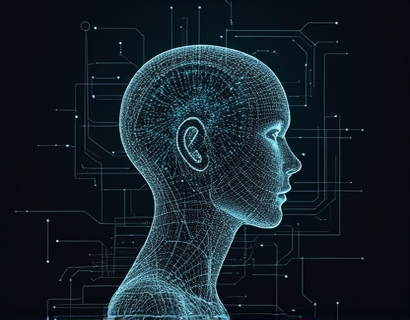Revolutionizing Business Analytics with AI and Blockchain: A New Era of Secure and Transparent User Tracking Solutions
The integration of Artificial Intelligence (AI) and Blockchain technology is transforming the landscape of business analytics, particularly in the realm of user tracking and behavior analysis. This fusion offers unprecedented opportunities for businesses to gain deep insights into user behavior, enhance customer engagement, and make strategic decisions based on robust data. This article delves into how this cutting-edge combination is reshaping the way companies approach analytics, ensuring a secure and transparent experience for all stakeholders.
The Intersection of AI and Blockchain in Analytics
AI has revolutionized data analysis by enabling businesses to process and interpret vast amounts of data quickly and accurately. When combined with Blockchain, a decentralized and immutable ledger technology, the potential for secure and transparent analytics solutions becomes even more profound. Blockchain's inherent properties of transparency, security, and traceability complement AI's capabilities in data processing and pattern recognition, creating a powerful toolset for business analytics.
Enhanced User Behavior Insights
One of the most significant benefits of integrating AI and Blockchain in business analytics is the ability to gain deep insights into user behavior. AI algorithms can analyze complex patterns in user interactions, predicting future behaviors and preferences with high accuracy. Blockchain ensures that this data is collected and stored securely, maintaining the integrity and authenticity of the information. This combination allows businesses to understand their users better, tailor experiences to individual needs, and improve overall engagement.
Secure Data Collection and Storage
Data security is a paramount concern for businesses and users alike. Traditional analytics methods often struggle to provide a secure environment for data collection and storage, making them vulnerable to breaches and unauthorized access. Blockchain technology addresses this issue by providing a decentralized and tamper-proof ledger for storing user data. Each transaction or data point is encrypted and linked to the previous one, creating an unbreakable chain. This ensures that user information remains confidential and secure, building trust and compliance with regulatory standards.
Transparent Analytics Processes
Transparency is another critical aspect of the AI and Blockchain partnership in business analytics. Blockchain's transparent nature allows all stakeholders to verify the data and processes involved in analytics. This transparency not only builds trust but also ensures accountability. Businesses can demonstrate to their customers and partners that their data is handled ethically and responsibly, fostering stronger relationships and loyalty.
Improved Data Integrity and Accuracy
The accuracy of data is crucial for making informed business decisions. AI algorithms can identify and correct anomalies in data sets, but the integrity of the data starts with its collection and storage. Blockchain ensures that the data used for analytics is accurate and unaltered. Each data entry is time-stamped and linked to the previous entry, making it impossible to manipulate historical data without detection. This level of data integrity is essential for reliable analytics and strategic planning.
Enhanced Customer Engagement
Understanding user behavior is key to enhancing customer engagement. By leveraging AI to analyze user interactions and Blockchain to ensure data security and transparency, businesses can create personalized and relevant experiences for their customers. Tailored recommendations, targeted marketing campaigns, and improved user interfaces are just a few ways this combination can drive higher engagement and satisfaction. Customers are more likely to interact with brands that demonstrate a genuine understanding of their needs and preferences.
Data-Driven Decision Making
Accurate and timely data is the foundation of data-driven decision making. The integration of AI and Blockchain provides businesses with a robust framework for making informed decisions. AI can process large volumes of data from various sources, identifying trends and insights that might go unnoticed by human analysts. Blockchain ensures that this data is reliable and trustworthy, allowing businesses to make confident decisions based on solid evidence. This synergy between AI and Blockchain empowers companies to stay ahead in a competitive market.
Regulatory Compliance and Ethical Considerations
As businesses adopt AI and Blockchain for analytics, compliance with regulations such as GDPR and CCPA becomes increasingly important. Blockchain's transparent and immutable nature helps in meeting these regulatory requirements by providing clear records of data usage and consent. AI algorithms can also be designed to adhere to ethical standards, ensuring that user data is handled responsibly and without bias. This combination not only protects businesses from legal risks but also enhances their reputation as ethical and responsible entities.
Challenges and Considerations
While the potential benefits are significant, there are challenges and considerations to keep in mind when implementing AI and Blockchain in business analytics. Scalability remains a key issue, as both technologies require substantial computational resources. Additionally, the complexity of integrating these technologies into existing systems can be daunting. Businesses must invest in skilled personnel and robust infrastructure to overcome these challenges. Privacy concerns also need to be addressed, ensuring that user data is handled with the utmost care and respect for individual rights.
Case Studies and Real-World Applications
Several companies have already begun to harness the power of AI and Blockchain for analytics. For instance, a leading e-commerce platform implemented a Blockchain-based user tracking system to enhance data security and transparency. By using AI to analyze user behavior data stored on the Blockchain, the platform was able to personalize user experiences, leading to a significant increase in customer engagement and sales. Another example is a financial services firm that used this combination to improve fraud detection and prevent unauthorized transactions, ensuring both security and compliance.
Future Trends and Innovations
The future of business analytics is bright with the continued advancement of AI and Blockchain technologies. Emerging trends such as edge computing and quantum computing are set to further enhance the capabilities of these technologies. Edge computing can reduce latency and improve real-time data processing, while quantum computing has the potential to solve complex problems that are currently infeasible. These advancements will make AI and Blockchain even more powerful tools for business analytics, opening up new possibilities for innovation and growth.
Conclusion
The fusion of AI and Blockchain is revolutionizing business analytics by providing secure, transparent, and insightful user tracking solutions. This combination empowers businesses to gain deep insights into user behavior, enhance customer engagement, and make data-driven decisions with confidence. As the technologies continue to evolve, the potential for transformative impact in the business world is immense. Embracing this revolution can give companies a competitive edge and pave the way for a more secure and transparent future in analytics.




































